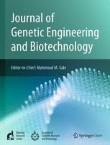Ver ítem
- xmlui.general.dspace_homeCentros e Institutos de InvestigaciónCICVyA. Centro de Investigación en Ciencias Veterinarias y AgronómicasInstituto de GenéticaArtículos científicosxmlui.ArtifactBrowser.ItemViewer.trail
- Inicio
- Centros e Institutos de Investigación
- CICVyA. Centro de Investigación en Ciencias Veterinarias y Agronómicas
- Instituto de Genética
- Artículos científicos
- Ver ítem
Stress-induced expression of IPT gene in transgenic wheat reduces grain yield penalty under drought
Resumen
Background: The heterologous expression of isopentenyl transferase (IPT) under the transcriptional control of the senescence-associated receptor-like kinase (SARK) promoter delayed cellular senescence and, through it, increased drought tolerance in plants. To evaluate the effect of pSARK::IPT expression in bread wheat, six independent transgenic events were obtained through the biolistic method and evaluated transgene expression, phenology, grain yield
[ver mas...]
Background: The heterologous expression of isopentenyl transferase (IPT) under the transcriptional control of the senescence-associated receptor-like kinase (SARK) promoter delayed cellular senescence and, through it, increased drought tolerance in plants. To evaluate the effect of pSARK::IPT expression in bread wheat, six independent transgenic events were obtained through the biolistic method and evaluated transgene expression, phenology, grain yield and physiological biomass components in plants grown under both drought and well-irrigating conditions. Experiments were performed at different levels: (i) pots and (ii) microplots inside a biosafety greenhouse, as well as under (iii) field conditions.
Results: Two transgenic events, called TR1 and TR4, outperformed the wild-type control under drought conditions. Transgenic plants showed higher yield under both greenhouse and field conditions, which was positively correlated to grain number (given by more spikes and grains per spike) than wild type. Interestingly, this yield advantage of the transgenic events was observed under both drought and well-watered conditions.
Conclusions: The results obtained allow us to conclude that the SARK promoter-regulated expression of the IPT gene in bread wheat not only reduced the yield penalty produced by water stress but also led to improved productivity under well-watered conditions.
[Cerrar]

Autor
Beznec, Ailin;
Faccio, Paula Daniela;
Miralles, Daniel J.;
Abeledo, Leonor Gabriela;
Decima Oneto, Cecilia Andrea;
Garibotto, María De Belén;
Gonzalez, Germán Andrés;
Moreyra, Federico;
Elizondo, Matias;
Ruiz, Monica Beatriz;
Lewi, Dalia Marcela;
Blumwald, Eduardo;
Llorente, Berta;
Diaz Paleo, Antonio Horacio;
Bossio, Adrian Ezequiel;
Fuente
Journal of Genetic Engineering and Biotechnology 19 : 1-17. (May 2021)
Fecha
2021-05
Editorial
Springer
Documentos Relacionados
Formato
pdf
Tipo de documento
artículo
Proyectos
(ver más)
INTA/PNBIO-1131024/AR./Desarrollo de sistemas alternativos de generación y utilización de variabilidad genética y su aplicación al mejoramiento de los cultivos.
Palabras Claves
Derechos de acceso
Abierto
 Excepto donde se diga explicitamente, este item se publica bajo la siguiente descripción: Creative Commons Attribution-NonCommercial-ShareAlike 2.5 Unported (CC BY-NC-SA 2.5)
Excepto donde se diga explicitamente, este item se publica bajo la siguiente descripción: Creative Commons Attribution-NonCommercial-ShareAlike 2.5 Unported (CC BY-NC-SA 2.5)


